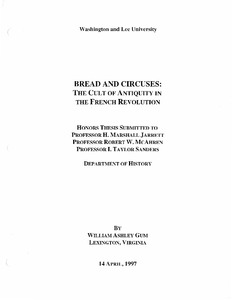| dc.rights.license | In Copyright | en_US |
| dc.creator | Gum, William Ashley | |
| dc.date.accessioned | 2023-10-20T18:01:33Z | |
| dc.date.available | 2023-10-20T18:01:33Z | |
| dc.date.created | 1997 | |
| dc.identifier | WLURG038_Gum_thesis_1997 | |
| dc.identifier.uri | https://dspace.wlu.edu/handle/11021/36528 | |
| dc.description.abstract | The Roman Juvenal wrote that the best way to quell civic unrest was to give the people what they want: bread and circuses. This thesis will explore Harold T. Parker's Cult of Antiquity in the French Revolution. Parker's work shows that the French Revolutionaries truly emulated and probably loved the classical models of Greece and Rome. In our study, we will focus upon the cult and attempt to determine whether it was an idealistic model or simply "bread and circuses": a sort of bridge between the masses and the nobility that arose to lead France following the demise of the ancien regime. Throughout the thesis, we should bear in mind the advice of Livy to readers of his Book 1: "What chiefly makes the study of history wholesome and profitable is this, that you behold the lessons of every kind of experience set forth as on a conspicuous monument; from these you may choose for yourself and for your own state what to imitate, from these mark for avoidance what is shameful in the conception and shameful in the result. [1] This essay is not an examination of the Greek and Roman past. Rather, it will explore a filtered classical past: one that the Revolutionaries of the eighteenth century recreated for their own times. The first portion of the thesis will focus on the conflict between education and philosophy of pre-revolutionary France. The study will continue with a detailed discussion of the Enlightened philosophes and the assimilation of their
ideas into pre-revolutionary society. Next, we will examine the American Revolution as a catalyst for later events in France. The final chapter of the thesis will explore different
rhetorical and artistic manifestations of the cult. It will attempt to answer the main question of the thesis in light of Livy's quote: which lessons did the French state choose to take from the Ancients, and why? [From Introduction] | en_US |
| dc.format.extent | 92 pages | en_US |
| dc.language.iso | en_US | en_US |
| dc.rights | This material is made available for use in research, teaching, and private study, pursuant to U.S. Copyright law. The user assumes full responsibility for any use of the materials, including but not limited to, infringement of copyright and publication rights of reproduced materials. Any materials used should be fully credited with the source. | en_US |
| dc.rights.uri | http://rightsstatements.org/vocab/InC/1.0/ | en_US |
| dc.subject.other | Washington and Lee University -- Honors in History | en_US |
| dc.title | Bread and Circuses: The Cult of Antiquity in the French Revolution | en_US |
| dc.type | Text | en_US |
| dcterms.isPartOf | WLURG038 - Student Papers | en_US |
| dc.rights.holder | Gum, William Ashley | en_US |
| dc.subject.fast | Revolution (France : 1789-1799) | en_US |
| dc.subject.fast | Classical antiquities | en_US |
| dc.subject.fast | Parker, Harold Talbot, 1907- | en_US |
| local.department | History | en_US |
